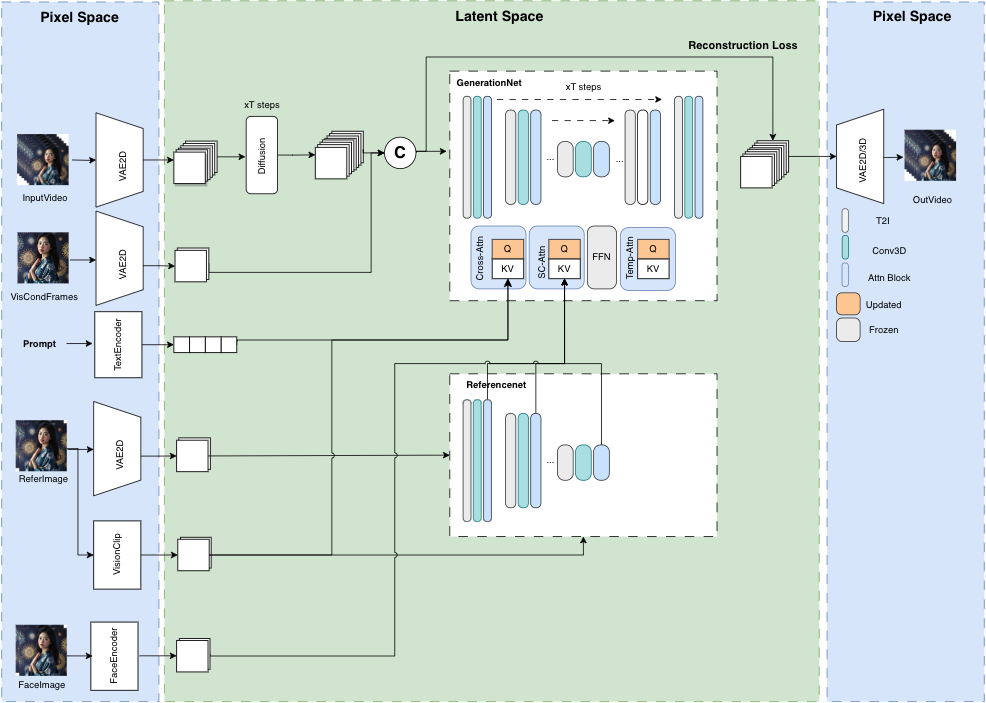license: creativeml-openrail-m
language:
- en
library_name: diffusers
pipeline_tag: text-to-video
tags:
- AIGC
- text2video
- image2video
- infinite-length
- human
MuseV: Infinite-length and High Fidelity Virtual Human Video Generation with Visual Conditioned Parallel Denoising
Zhiqiang Xia *,
Zhaokang Chen*,
Bin Wu†,
Chao Li,
Kwok-Wai Hung,
Chao Zhan,
Yingjie He,
Wenjiang Zhou
(*Equal Contribution, †Corresponding Author, [email protected])
Lyra Lab, Tencent Music Entertainment
github huggingface HuggingfaceSpace [project](comming soon) Technical report (comming soon)
We have setup the world simulator vision since March 2023, believing diffusion models can simulate the world. MuseV was a milestone achieved around July 2023. Amazed by the progress of Sora, we decided to opensource MuseV, hopefully it will benefit the community. Next we will move on to the promising diffusion+transformer scheme.
We will soon release MuseTalk, a real-time high quality lip sync model, which can be applied with MuseV as a complete virtual human generation solution. Please stay tuned!
Overview
MuseV is a diffusion-based virtual human video generation framework, which
- supports infinite length generation using a novel Visual Conditioned Parallel Denoising scheme.
- checkpoint available for virtual human video generation trained on human dataset.
- supports Image2Video, Text2Image2Video, Video2Video.
- compatible with the Stable Diffusion ecosystem, including
base_model,lora,controlnet, etc. - supports multi reference image technology, including
IPAdapter,ReferenceOnly,ReferenceNet,IPAdapterFaceID. - training codes (comming very soon).
News
- [03/27/2024] release
MuseVproject and trained modelmusev,muse_referencenet,muse_referencenet_pose.
Model
overview of model structure
parallel denoising
Cases
All frames are generated from text2video model, without any post process.
Bellow Case could be found in configs/tasks/example.yaml
Text/Image2Video
Human
| image | video | prompt |

|
(masterpiece, best quality, highres:1),(1girl, solo:1),(beautiful face, soft skin, costume:1),(eye blinks:{eye_blinks_factor}),(head wave:1.3) | |

|
(masterpiece, best quality, highres:1),(1girl, solo:1),(beautiful face, soft skin, costume:1),(eye blinks:{eye_blinks_factor}),(head wave:1.3) | |

|
(masterpiece, best quality, highres:1), peaceful beautiful sea scene | |

|
(masterpiece, best quality, highres:1), peaceful beautiful sea scene | |

|
(masterpiece, best quality, highres:1), playing guitar | |

|
(masterpiece, best quality, highres:1), playing guitar | |

|
(masterpiece, best quality, highres:1), playing guitar | |

|
(masterpiece, best quality, highres:1), playing guitar | |

|
(masterpiece, best quality, highres:1),(1man, solo:1),(beautiful face, soft skin, costume:1),(eye blinks:{eye_blinks_factor}),(head wave:1.3) | |

|
(masterpiece, best quality, highres:1),(1girl, solo:1),(beautiful face, soft skin, costume:1),(eye blinks:{eye_blinks_factor}),(head wave:1.3) | |

|
(masterpiece, best quality, highres:1),(1man, solo:1),(beautiful face, soft skin, costume:1),(eye blinks:{eye_blinks_factor}),(head wave:1.3) | |

|
(masterpiece, best quality, highres:1),(1girl, solo:1),(beautiful face, soft skin, costume:1),(eye blinks:{eye_blinks_factor}),(head wave:1.3) | |

|
(masterpiece, best quality, highres:1),(1girl, solo:1),(beautiful face, soft skin, costume:1),(eye blinks:{eye_blinks_factor}),(head wave:1.3) |
scene
| image | video | prompt |

|
(masterpiece, best quality, highres:1), peaceful beautiful waterfall, an endless waterfall | |

|
(masterpiece, best quality, highres:1), peaceful beautiful river | |

|
(masterpiece, best quality, highres:1), peaceful beautiful sea scene |
VideoMiddle2Video
pose2video
In duffy case, pose of the vision condition frame is not aligned with of the first frame of control video. posealign module can solve it.
| image | video | prompt |


|
(masterpiece, best quality, highres:1) | |

|
(masterpiece, best quality, highres:1) |
MuseTalk
| name | video |
| talk | |
| talk | |
| sing |
Quickstart
please refer to MuseV
Acknowledgements
- MuseV has referred much to TuneAVideo, diffusers, Moore-AnimateAnyone, animatediff, IP-Adapter, AnimateAnyone, VideoFusion, insightface.
- MuseV has been built on
ucf101andwebviddatasets.
Thanks for open-sourcing!
Limitation
There are still many limitations, including
- Lack of generalization ability. Some visual condition image perform well, some perform bad. Some t2i pretraied model perform well, some perform bad.
- Limited types of video generation and limited motion range, partly because of limited types of training data. The released
MuseVhas been trained on approximately 60K human text-video pairs with resolution512*320.MuseVhas greater motion range while lower video quality at lower resolution.MuseVtends to generate less motion range with high video quality. Trained on larger, higher resolution, higher quality text-video dataset may makeMuseVbetter. - Watermarks may appear because of
webvid. A cleaner dataset withour watermarks may solve this issue. - Limited types of long video generation. Visual Conditioned Parallel Denoise can solve accumulated error of video generation, but the current method is only suitable for relatively fixed camera scenes.
- Undertrained referencenet and IP-Adapter, beacause of limited time and limited resources.
- Understructured code.
MuseVsupports rich and dynamic features, but with complex and unrefacted codes. It takes time to familiarize.
Citation
@article{musev,
title={MuseV: Infinite-length and High Fidelity Virtual Human Video Generation with Visual Conditioned Parallel Denoising},
author={Xia, Zhiqiang and Chen, Zhaokang and Wu, Bin and Li, Chao and Hung, Kwok-Wai and Zhan, Chao and He, Yingjie and Zhou, Wenjiang},
journal={arxiv},
year={2024}
}
Disclaimer/License
code: The code of MuseV is released under the MIT License. There is no limitation for both academic and commercial usage.model: The trained model are available for non-commercial research purposes only.other opensource model: Other open-source models used must comply with their license, such asinsightface,IP-Adapter,ft-mse-vae, etc.- The testdata are collected from internet, which are available for non-commercial research purposes only.
AIGC: This project strives to impact the domain of AI-driven video generation positively. Users are granted the freedom to create videos using this tool, but they are expected to comply with local laws and utilize it responsibly. The developers do not assume any responsibility for potential misuse by users.

